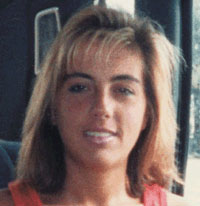A respectful retrospective of Terry Schiavo's life and execution

Terry Schiavo, courtesy of New York Review of Books
Ms. Didion's essay followed the facts, carefully analyzed the issues involved and presented a sober evaluation of the entire tragedy. In particular, I think she raised some interesting points, especially questions that no one in society faced during the contraversy:
The question began with the different ways in which we define a life worth living, but it did not stop there. The question had ultimately to do with whether or not there could be occasions when the broad economic and ethical interests of the society at large should outweigh any individual claim to either the most advanced medical attention (which Theresa Schiavo, outside the one procedure at UCSF in 1990, did not have) or indefinite care. This was the question no one on any side of the debate wanted to hear. This was the question conveniently muffled by talk about "right-to-die" and "murderers" and "mullahs," about the "freak show," the "circus."
She makes a fair case. I didn't find a hint of the snere that I've come to expect from elite media. I also appreciated the unique sensitivity to which she affords those of us that take religion seriously:
Once we had recast the case of Theresa Schiavo as one involving the right to die, then, there could be, from the "rational" or secular point of view, only one correct conclusion: that if she had expressed beyond any possibility of doubt a desire not to have her life prolonged in the condition she was now in, she had the "right" to have her feeding tube removed, which was to say the right to control over her own life and death.
As we have seen, the record showed no such indisputable expression. Yet even if we had managed to convince ourselves that this case involved the right to die, a problem remained. No one even casually exposed to religious teaching believes any such right exists. "So teach us to number our days," the Episcopal litany asks, "so that we may apply our hearts unto wisdom." This is a prayer for the wisdom to accept that death is inevitable, not a plea for control over its timing. "Control" itself, when it comes to the natural processes of life and death, is seen as an illusion, an error we learn through life to relinquish. This is by no means a view confined to Christian fundamentalists. It is a view shared by anyone whose ethical principles or general idea of how life works have at any point been touched by any of the world's major religions.
And here again:
That this was a situation offering space for legitimate philosophical differences seemed obvious. Yet there remained, on the "rational" side of the argument, very little acknowledgment that there could be large numbers of people, not all of whom could be categorized as "fundamentalists" or "evangelicals," who were genuinely troubled by the ramifications of viewing a life as inadequate and so deciding to end it. There remained little acknowledgment even that the case was being badly handled, rendered unnecessarily inflammatory. There was an insensitivity in the timing of the removal of the feeding tube, which took place on the Friday before Palm Sunday, meaning that the gradual process of dying coincided with a week that for Christians has specifically to do with sacrificial suffering and death. "Oh come on," someone said when this was mentioned on a cable show.
The Case of Terry Schiavo unfortunately exemplifies the Dictatorship of Moral Relativism in action. Ms. Didion demonstrated how those of the "secular" and "rational" perspective were so willing to believe that Terry had somehow authorized her own end. To these reasonable people, the individual is the center of all authority, so what one says goes. "After all", they could say, "there's nothing out there, so we're all we've got to refer to when we determine the meaning of our lives."
Obviously Fools like ourselves disagree. We seem to hopelessly dwell on this strange and anachronistic idea that God has authored our lives and our end. Therefore we can't decide to pull the plug whenever we want. Perhaps that's why we were quick to point out the uncertainty of Terry Schiavo's intention, which Ms. Didion explains in detail. Even if the secularists are right in general, they couldn't be more wrong in this particular case. Unfortunately, the noble and reasonable Judge Greer ruled on illegitimately admitted hearsay to the contrary.
What troubles me is Ms. Didion's question about to what extent society should invest in the health needs of any individual. Given that far too many (approaching 75% in some admittedly poorly written polls) citizens of this republic of ours support a "right to die", I doubt that soon the prevaling wisdom will be to throw such persons under the bus and pull those plugs! Those Foolish individuals (like us?) that value life had better find a way to evangelize this culture. Otherwise, the law will be the knife that cuts the last cord of life that some will every have.





















<< Home